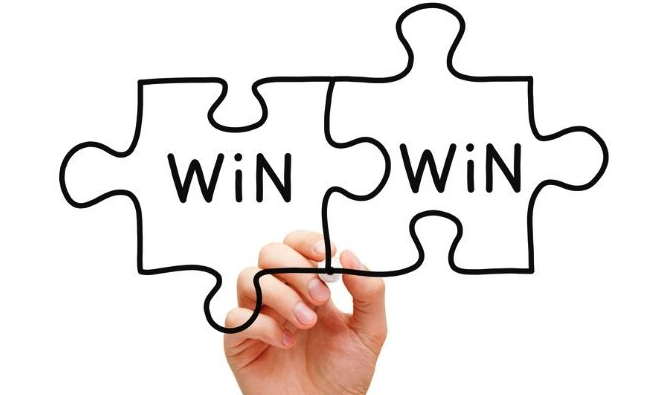In today’s competitive world, success is often associated with a zero-sum game, where one person’s triumph comes at the expense of others. However, “Think Win-Win,” one of the seven habits of highly effective people, challenges this mindset. Coined by Stephen R. Covey in his book, “The 7 Habits of Highly Effective People,” the Win-Win paradigm emphasizes the importance of seeking mutually beneficial outcomes in all interactions. Today, we will explore the concept of Think Win-Win and understand how adopting this approach can lead to greater success, improved relationships, and a more fulfilling life.

Understanding Think Win-Win
Think Win-Win is a mindset that recognizes the value of cooperation and collaboration. It involves seeking solutions that are not only advantageous to oneself but also consider the interests and needs of others. The Win-Win approach acknowledges that when people work together towards a common goal, everyone can achieve success and satisfaction.
Contrary to the competitive Win-Lose mentality, which promotes self-centeredness and short-term gains, Think Win-Win fosters an abundance mindset. It believes that there are enough resources, opportunities, and successes to go around for everyone, without depriving others of their chance to excel. Rather than viewing others as adversaries, individuals adopting Think Win-Win see them as potential collaborators and partners in achieving shared success.
Benefits of Think Win-Win
- Enhanced Relationships: Adopting a Win-Win mindset cultivates a positive and empathetic attitude toward others. By actively seeking mutually beneficial outcomes, individuals build strong and trusting relationships, both personally and professionally. When people feel valued and respected, it becomes easier to collaborate, communicate effectively, and resolve conflicts constructively.
- Increased Creativity and Innovation: Think Win-Win encourages an open exchange of ideas and diverse perspectives. When individuals collaborate, combining their unique strengths and expertise, they create an environment that stimulates creativity and innovation. By leveraging collective intelligence, teams can develop groundbreaking solutions and achieve outcomes that surpass individual efforts.
- Sustainable Success: Win-Win fosters sustainable success by promoting long-term thinking. Instead of resorting to tactics that yield short-term gains at the expense of others, individuals with a Win-Win mindset focus on building enduring relationships, maintaining trust, and creating win-win outcomes repeatedly. Such an approach establishes a foundation for continued growth and success.
- Personal Fulfillment: The Win-Win paradigm aligns personal and professional goals with the values of integrity, collaboration, and empathy. When individuals prioritize mutual benefits and genuine concern for others, they experience a sense of fulfillment and purpose. Helping others succeed becomes an inherent part of their success journey, leading to a more satisfying and meaningful life.
Practicing Think Win-Win
Adopting the Think Win-Win approach requires a conscious effort to shift our perspective and behavior. Here are some strategies to practice and cultivate a Win-Win mindset:
- Seek Mutual Goals: Identify shared objectives and work towards finding solutions that benefit all parties involved. This involves active listening, empathizing with others’ needs, and looking for creative alternatives that address everyone’s interests.
- Collaborate and Communicate: Effective collaboration and communication are essential for Win-Win outcomes. Encourage open dialogue, exchange feedback, and maintain transparency to foster trust and build strong relationships. Value the opinions and contributions of others, fostering an inclusive and collaborative environment.
- Embrace Abundance Mentality: Replace scarcity thinking with an abundance mindset. Recognize that there are ample resources, opportunities, and successes available for everyone. Celebrate the achievements of others, seeing them as inspiration rather than competition.
- Win-Win or No Deal: In situations where finding a mutually beneficial solution seems challenging, be willing to consider alternatives, such as “No Deal.” It is better to walk away from an agreement that doesn’t meet both parties’ needs rather than settle for a suboptimal outcome.
- Practice Empathy and Understanding: Put yourself in others’ shoes to better understand their perspectives and motivations. Empathy helps build rapport, strengthens relationships, and facilitates win-win problem-solving by considering diverse viewpoints.
Conclusion
Adopting the Think Win-Win paradigm is not just a strategy for successful interactions; it is a transformative mindset that shapes our approach to life. By fostering collaboration, empathy, and mutual benefit, we create an environment conducive to personal growth, harmonious relationships, and sustainable success. Embracing Win-Win thinking allows us to transcend the limitations of a zero-sum game and discover a world of abundant opportunities where everyone can thrive. So, let’s challenge the status quo and choose Win-Win for a more fulfilling and prosperous future.


